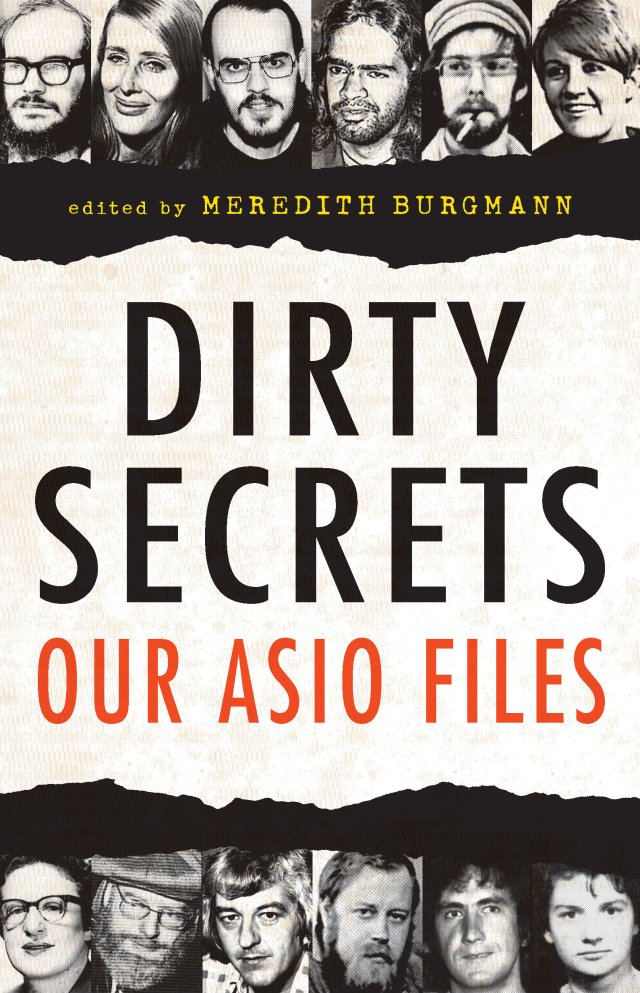
Dirty Secrets: Our ASIO Files
Edited by Meredith Burgmann
Newsouth, 2014
464 pages, $32.99 (pb)
The only thing worse, notes Meredith Burgmann in Dirty Secrets, than discovering that your personal file held by Australia’s domestic political police, ASIO, is disappointingly thin is to find out that your official subversion rating hasn’t warranted a file at all.
Flippancy aside, two dozen of ASIO’s many thousands of targets (from High Court judges to gardening identities) take a serious look at their watcher. The secret body has doggedly spied on, and imperilled the jobs and personal relationships of, generations of left-wing and progressive activists engaged in frequently entirely legal political dissent.
The official justification for all this was combating communism, but the miniscule ring of those Australian communists actually involved in Soviet espionage was but a pretext for the establishment of ASIO in 1949.
Rather its riding instructions specified countering “subversion” — a hugely elastic term that covers all opposition to the conservative political and corporate status quo.
None of the political activity against the Vietnam War and apartheid, or for feminism, gay rights, nuclear disarmament or trade unionism was remotely concerned with “national security”. That is a magic incantation that chloroforms concerns about the infringement of civil liberties and democratic rights by political spying.
A protected bureaucratic species, ASIO’s files inexorably grew — devoid of any understanding of left-wing politics and padded out with mind-numbing minutiae, innocuous trivia, cavalier mistakes, malicious gossip, third-hand tittle-tattle from paid informers and worthless “intelligence” from agents reporting what their superiors wanted to hear.
In Dirty Secrets, a range of high-profile ASIO targets discuss their files. Some targets have sympathy for the working lives of ASIO’s telephone bugging transcribers, which must have comprised “utter tedium punctuated by short bursts of not very interesting activity”.
Forgiveness is also shown by film critic David Stratton, who says “no real harm was done”. This “I’m alright, Jack” attitude is shared by an equally complacent Jack — “I am not greatly concerned”, writes Jack Waterford, a Canberra Times editor and now occasional ASIO “consultant”.
ASIO’s often bumbling incompetence earns it the deliciously mocking humour of ABC broadcaster Phillip Adams. But such irreverence is complemented by more solid reflection on ASIO’s highly effective reality as a conservative political force.
As Burgmann notes, ASIO’s history of error and political bias casts serious doubt on whether it can be trusted today. “Do we simply ignore the history and cross our fingers about the future?” she asks sceptically.
The Cold War may have ended but ASIO’s budget and powers have been hugely expanded over the past decade. The rise of “terrorism” is the official rationale for ASIO’s growth, but, as some contributors show, public oversight and legal processes are lacking from ASIO’s response.
The organisation’s track record for poor quality information must compromise its non-reviewable “adverse findings” against asylum-seekers. ASIO may dress itself up as a “security service” or an “intelligence agency”, but it should be called after its real function — a political police force. Political police belong in a police state not a democracy.
ASIO also continues its political mission by spying on coal protesters, among other activist groups, but these files remain exempt from public access under the “30 year rule”. So, only if you were causing political disorder more than three decades ago can you check to see if ASIO has a file on you (start by checking series A611 at the National Archives of Australia website, naa.gov.au).
But beware — by requesting access to a file that may not exist you “may well be able to start one by demanding to see [your] file”.